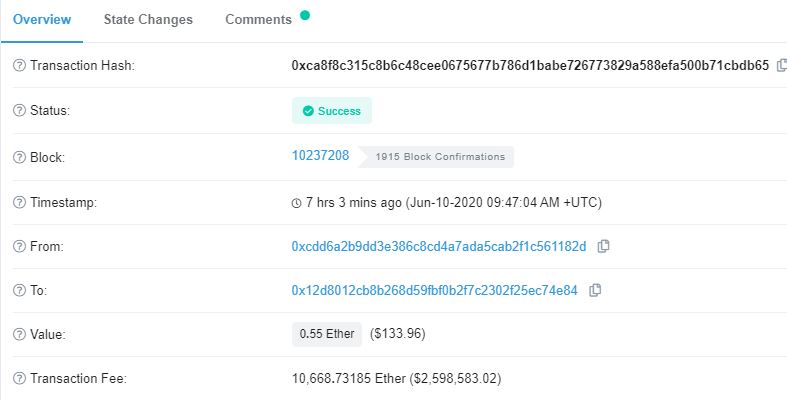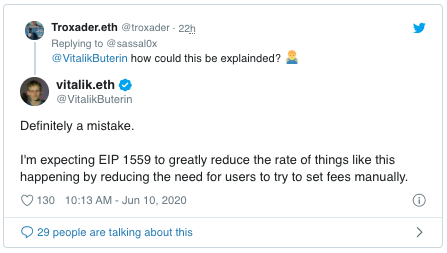Questions Linger on Why Anyone Would Pay 26M in Ethereum ETH Fees

Questions Linger on Why Anyone Would Pay $2.6M in Ethereum (ETH) Fees
Someone paid $2.6 Million in Ethereum fees for a transaction worth approximately $134.

John P. Njui • ETHEREUM (ETH) NEWS • June 10, 2020
In brief:
- Earlier today, 0.55 ETH was transferred for a transaction fee of 10,668.73 ETH.
- This translates to approximately $2.6 Million in fees paid for a transaction worth $134.
- Although initially seen as a mistake, questions still linger on other possible explanations.
A transaction on the Ethereum blockchain has crypto enthusiasts scratching their heads as to whether the initiator of the transaction made a mistake, or whether the sender knew what they were doing. The transaction in question involves the transfer of 0.55 ETH for a hefty transaction fee of 10,668 Ethereum. Below is a screenshot of the transaction that can also be tracked via Etherscan.

Investigation in Progress
The team at StarkPool.com has responded to the event by stating that they are investigating as to what really led to the sender initiating and approving a transaction with such a high fee. StarkPool focuses on professional mining pool services and the team responded to the event by stating there will be a solution in the end.
The mention of experience by StarkPool is in reference to a similar event in March 2019 when an Ethereum user accidentally paid 2,100 ETH in transaction fees by confusing the fields required to send an ETH transaction. The incident was solved with StarkPool refunding 1,050 ETH.
Ethereum’s Vitalik Chimes In
The enormity of the mistake has caught the attention of Ethereum Co-Founder, Vitalik Buterin, who is for the opinion that the transaction was a definite mistake. His comment regarding the event was via the following tweet.
Questions Still Linger on the $2.6M in Ethereum Fees
However, despite Vitalik’s comments that the transaction might have been a mistake, there is the additional possibility that the input was intentional and that the yet-to-be-identified sender, knew what s/he was doing. One plausible theory is that the transaction was what is known as a Trade-Based Money Laundering (TBML) transaction. This theory was put forth by @benjaminjwhitby.
Disclaimer: This article is not meant to give financial advice. Any additional opinion herein is purely the author’s and does not represent the opinion of EWN or any of its other writers. Please carry out your own research before investing in any of the numerous cryptocurrencies available. Thank you.
Original article posted on the EthereumWorldNews.com site, by John P. Njui.
Article re-posted on Markethive by Jeffrey Sloe
Visit MarketHive to learn more: http://markethive.com/jeffreysloe



